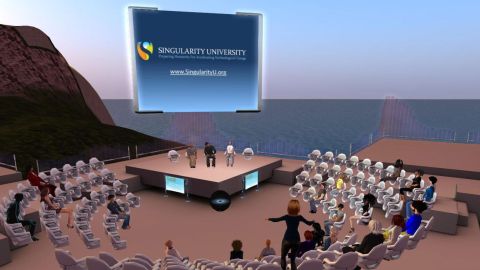The Impending Black Hole of Technology and What We Can Do

The linear thinking model of traditional universities may have served our hunter-gatherer ancestors well. (An elk running through the forest at point A will be at point B when a hunter unleashes his spear, etc.) But recent technological discoveries have presented humanity with a new set of problems, which require an entirely new kind of thinking. One institution, Singularity University, is working to develop that new kind of thinking.
The principle of exponentially-growing technology was most famously elucidated in 1965 by Gordon E. Moore, co-founder of Intel Corporation. Moore was describing the trend that the number of transistors on a circuit doubles roughly every two years. This principle, now known as Moore’s Law, also describes the exponential growth rate of dozens of technologies, including microchip processing speeds, computer memory, and Internet speed.
It didn’t take long for inventor and futurist, Dr. Ray Kurzweil, to recognize other implications of the law. The technological advance at the heart of Kurzweil’s book, The Singularity is Near, is the imminent merging of humanity with machine in what most people think of as Artificial Intelligence. Kurzweil writes, “Just as a black hole in space dramatically alters the patterns of matter and energy accelerating toward its event horizon, this impending Singularity in our future is increasingly transforming every institution and aspect of human life, from sexuality to spirituality.”
When Dr. Peter Diamandis, founder of the X-Prize, read Kurzweil’s book he was struck by the way such technology influences fields as diverse as biotechnology, nanotechnology, medicine, ecological systems, ethics, and entrepreneurship. His conviction that technology holds the power to solve the world’s greatest problems lead to the founding of Singularity University (SU).
But, of course, there is also is an inherent danger in the exponential growth of such advancements. “The reason why we’re focusing on these technologies is that they are naturally scaling and they scale on a global level,” Executive Director Salim Ismail recently told TechCrunch. “And the core [of the focus] is that if we don’t address some of our global challenges with technology then we often end up in war.”
Kurzweil himself harbors no delusions regarding the potentially destructive implications of the Artificial Intelligence Singularity – that we might create our own masters. Our inability to comprehend an intelligence greater than our own is the AI equivalent to the unraveling of conventional physics in a black hole. We can’t possibly know how such a superior intelligence might decide to deal with its creators.
The power and urgency behind this research has proved quite alluring to young academics.
In spite of SU’s hefty tuition ($25,000 for a ten-week summer program) the university received applications from 2,200 applicants in 109 countries last year. Of those, 80 students were selected. The students are divided into various accelerating technology team projects – each centered around a major issue like global health, poverty, energy, education, security, or space and known collectively as the “10^9+ Projects” – and attend roughly 300 hours of lectures from 160 speakers. What happens next? Well, that’s a bit more difficult to explain.
“You can’t script innovation,” says Ismail. “Basically, we’re creating a crucible in which we take the top thinkers in the fastest moving technologies, the most accomplished young next-gen leaders, give them a state-of-the-art and future view of these technologies and point them at the biggest problems.” So far, team projects have led to the creation of seven companies, all of which aim to revolutionize the planet.
On August 26, 2011, the students, representing 36 countries, presented pitches for future businesses at the 2011 Student Project EXPO. The goal is to positively impact the lives of one billion people in ten years.
Click here to read about Matternet, a company that transports food, medicine and any number of goods to remote locations in much the same way one sends an email.





